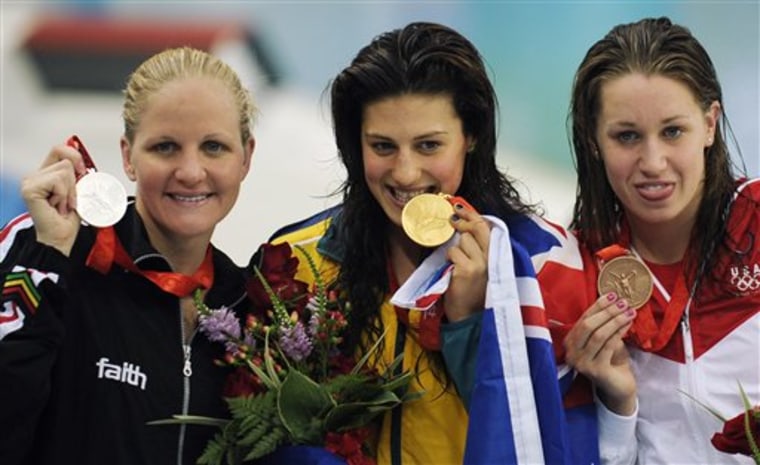Nobody talks about losing here. You may think that when you see someone who was predicted to win something standing on the second or third step of the medal stand while another country’s national anthem fills the arena. It’s rarer than a week without smog in Beijing to hear an athlete say, “I lost.”
You didn’t hear it on Sunday in the basement of the Water Cube, where Larsen Jensen and Katie Hoff finished third in their races and the U.S. Women’s 4x100-meter relay finished second to the Netherlands’ reigning world champions.
For that matter, you didn’t hear it from Zhang Lin of China, who finished behind Park Taehwan of Korea and ahead of Jensen in the men’s 400 freestyle. Or from the Australian women, who won bronze in the relay.
“I did the best I could,” said Hoff, who didn’t get the gold in the women’s 4x100 individual medley, the toughest race in swimming. “That all I could do.”
Hoff went out fast in what became a two-woman race between the eventual winner, Stephanie Price of Australia and Kristy Coventry of Zimbabwe. The 19-year-old American felt she might have gone a bit faster in the third leg of the race, the breaststroke, but she finished with her fastest 100-freestyle leg ever.
“I have to be happy,” she said, as she moved on to the next event in a program that could still bring her five more medals, some of which may yet be gold, all of which will be the best she can do.
Jensen said much the same. He started a bit slow, he said, “But I came home faster than I ever have. It’s an honor to bring home the bronze for the United States of America. It’s an honor and a privilege to have won the bronze medal.”
There wasn’t a gram of self-pity in his voice. Sure, he wanted the gold. It’s what he’s been training for most of his life. He did everything he possibly could to win, and, as the scoreboard told him, there were just two people in the entire world who could do better than he. That’s pretty good company.
And then there was Zhang, the home-town favorite but not a favorite to win the race that Park has dominated this year. He didn’t say, “Damn, I lost,” but only because he didn’t lose. He swam the best race he could, beat everybody in the world but one, and did better than anyone said he could.
“I would not think that I would gain the second place,” is how the translator interpreted his reaction. He did better than even he thought he could. The man’s a winner.
Finally, there was Dara Torres, the 41-year-old mom who anchored the U.S. Women’s relay. She looked fondly at her silver medal, the tenth Olympic medal she’s won in a career that began in 1984 in Los Angeles.
“To get silver here against these athletes is a tremendous feat,” she said. And it was.
We run on the gold standard in the United States, but we score the Olympics on the total number of medals of all flavors, not just gold. By the gold standard, Team USA had a disappointing Sunday in the pool — one gold and four medals of other colors. But by the way the Olympics keep score, it was a banner day — five medals in four races. The home team got one medal in the same four races.
I’m not making excuses for people who don’t win. This isn’t grade school or summer camp, where every kid gets a trophy because it’s better for their delicate self-esteem. The very best athletes in the world come to the Olympics, and every one of them has been training just as hard as he or she can for years just to make the Olympic team.
Most people have no idea just how hard these athletes work. They give up big chunks of their childhood, give up their social lives, give up hanging out at the mall, going out on dates every night, pigging out on greasy food just because it’s there. They put themselves through hard, brutal, lung-busting workouts — twice a day. Michael Phelps, perhaps the greatest athlete we’ve ever seen in any sport, has been in the pool working out every single day for nearly a year. That’s Sundays and holidays, too. On Thanksgiving Day, he swam intervals. On Christmas Day, he did some more. On New Year's, on President’s Day, on his birthday — in the pool, working out.
He demolished his own world record in the individual medley, but the race was neck-and-neck for 300 meters before he swam away in the final, 100-freestyle leg. The other guys in the race hadn’t taken many days off, either.
Ryan Lochte, another American, finished third in that race. He made no apologies, either. How could he? He’d done the best he could and finished third behind the greatest swimmer the world has ever seen. Only two people out of more than six billion on the planet did better than he. It’s like finishing second to Shakespeare and Mark Twain in a writing contest.
That’s nothing to apologize for.
